Related Research Articles
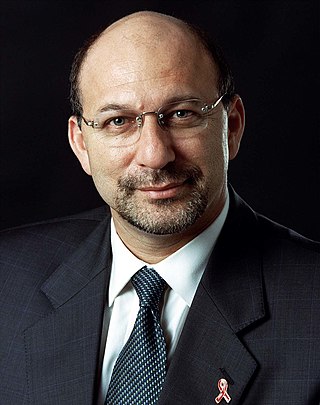
Trevor Andrew Manuel is a retired South African politician and former anti-apartheid activist who served in the cabinet of South Africa between 1994 and 2014. He was the Minister of Finance from 1996 to 2009 under three successive presidents. He was also the first post-apartheid Minister of Trade and Industry from 1994 to 1996 and later the Minister in the Presidency for the National Planning Commission from 2009 to 2014. He was a member of the National Executive Committee of the African National Congress (ANC) from 1991 to 2012.
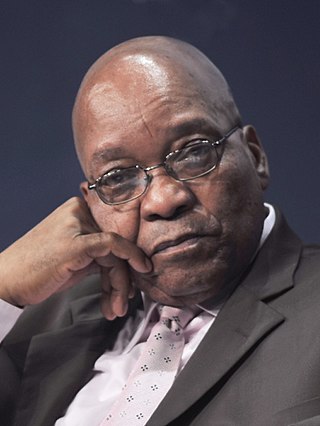
Jacob Gedleyihlekisa Zuma is a South African politician who served as the fourth president of South Africa from 2009 to 2018. He is also referred to by his initials JZ and clan names Nxamalala and Msholozi. Zuma was a former anti-apartheid activist, member of uMkhonto we Sizwe, and president of the African National Congress (ANC) from 2007 to 2017.
Nkosinathi Phiwayinkosi Thamsanqa Nhleko is a South African politician and former trade unionist from KwaZulu-Natal. He was the Minister of Police and Minister of Public Works in the second cabinet of President Jacob Zuma. After he was sacked from the cabinet in 2018, he served as a backbencher in the National Assembly until the 2019 general election.
The South African Revenue Service (SARS) is the revenue service of the South African government. It administers the country's tax system and customs service, and enforces compliance with related legislation. It is governed by the SARS Act 34 of 1997, which established it as "an organ of state within the public administration, but as an institution outside the public service." It thus has a significant degree of administrative autonomy, although it is under the policy control of the Minister of Finance. Effectively, SARS manages, administers, and implements the tax regime as designed by the Minister and National Treasury.

Samson Gwede Mantashe is a South African politician and former trade unionist who is currently serving as the Minister of Mineral Resources and Energy. He was Minister of Mineral Resources from February 2018 to May 2019, when his current portfolio was created. He is also serving his second term as the national chairperson of the African National Congress (ANC).

Corruption in South Africa includes the improper use of public resources for private ends, including bribery and improper favouritism. Corruption was at its highest during the period of state capture under the presidency of Jacob Zuma and has remained widespread, negatively "affecting criminal justice, service provision, economic opportunity, social cohesion and political integrity" in South Africa.

Pravin Jamnadas Gordhan is a politician and anti-apartheid activist who has held various ministerial posts in the Cabinet of South Africa. He served as Minister of Finance from 2009 until 2014 and again from 2015 until 2017, as Minister of Cooperative Governance and Traditional Affairs from 2014 until 2015, and as Minister of Public Enterprises since February 2018.

Ebrahim Patel is a South African politician and former trade unionist who has been Minister of Trade, Industry and Competition since May 2019. He previously served as Minister of Economic Development from 2009 to 2019.
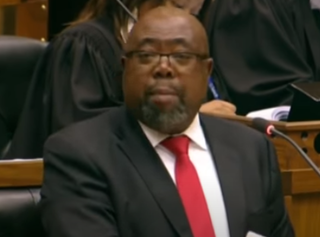
Thembelani Waltermade "Thulas" Nxesi is a South African politician and former trade unionist who has been the Minister of Employment and Labour since May 2019. A representative of the African National Congress (ANC), he has been a member of cabinet since October 2011 and the Deputy National Chairperson of the South African Communist Party (SACP) since July 2012.

The Minister of Public Service and Administration is a minister in the Cabinet of South Africa. The ministry provides political leadership to the national Department of Public Service and Administration. As of March 2023, the minister is Noxolo Kiviet.

Lindiwe Daphney Zulu is a South African politician and communications strategist who is currently serving as Minister of Social Development. Before her appointment to that office in May 2019, she was the Minister of Small Business Development from 2014 to 2019.

Buti Kgwaridi Manamela is a South African politician who is currently serving as the Deputy Minister of Higher Education, Science and Technology since October 2017. He was formerly the Deputy Minister in the Presidency from 2014 to 2017, and he has represented the African National Congress (ANC) in the National Assembly since May 2009.

Stella Tembisa Ndabeni-Abrahams is a South African politician who is currently serving as the Minister of Small Business Development since 5 August 2021. She previously served as Minister of Communications and Digital Technologies from November 2018 to August 2021. She is a member of the National Executive Committee (NEC) and a National Working Committee (NWC) of the African National Congress (ANC).
Tokozile Xasa is a South African politician who was the Minister of Sport and Recreation from February 2018 to May 2019. Before that, she was the Minister of Tourism from March 2017 to February 2018. A member of the National Assembly between 2009 and 2019, she took office as South African Ambassador to Belgium in February 2021.

Mathume Joseph Phaahla is a South African politician who is currently serving as the Minister of Health since August 2021. He was formerly the Deputy Minister of Health from May 2014 to August 2021. He had been a deputy minister since May 2009, when he joined the National Assembly. He is also a member of the National Executive Committee of the African National Congress (ANC).
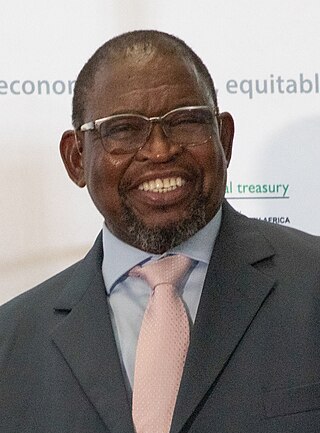
Enoch Godongwana is a South African politician and former trade unionist who is currently serving as the Minister of Finance since August 2021. He is a member of the National Executive Committee of the African National Congress (ANC).
The African National Congress Veterans' League (ANCVL) is an auxiliary political organisation of the African National Congress (ANC) of South Africa. Its members are ANC veterans, defined as people aged 60 or older who have belonged to the ANC for at least 40 years. The league was founded in December 2009 to represent veterans in the decision-making of the mainstream ANC. Since October 2017, its president has been Snuki Zikalala; Nelson Mandela was its honorary life president.
Lekota Lazarus "Lassy" Chiwayo is a South African politician, diplomat, and businessman from Mpumalanga. He was Mayor of Mbombela from 2008 until 2011, when he joined the diplomatic service.
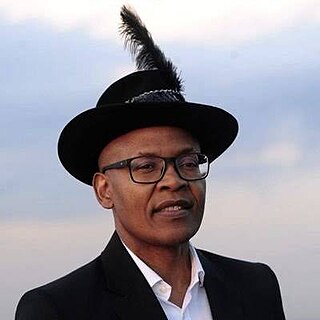
Mzwanele Jimmy Manyi is a South African politician, businessman, communications strategist, and former civil servant who has been a Member of the National Assembly of South Africa since 2023, representing the Economic Freedom Fighters. He has been the official spokesperson to former President Jacob Zuma and the Jacob G. Zuma Foundation since 2021. Between February 2011 and August 2012, he was official spokesperson of the South African government and head of the Government Communication and Information System (GCIS).
Busisiwe Mavuso is a South African businesswoman and the chief executive officer of Business Leadership South Africa. Before her appointment to that position in July 2019, she was the chief executive officer of the Black Management Forum between 2016 and 2017.
References
- 1 2 "Defining Business Leadership". Business Leadership South Africa. Retrieved 29 October 2023.
- 1 2 Pallister, David; Stewart, Sarah; Lepper, Ian (1987). South Africa Inc: The Oppenheimer Empire. Simon & Schuster. p. 61. ISBN 978-0-671-65448-1.
- ↑ Sampson, Anthony (1987). Black & Gold: Tycoons, Revolutionaries and Apartheid. London: Hodder & Stoughton. p. 90. ISBN 978-0-340-39524-0.
- ↑ Pallister, David (20 August 2000). "Harry Oppenheimer". The Guardian. ISSN 0261-3077 . Retrieved 29 October 2023.
- ↑ Burns, John F. (21 November 1976). "Industry Mellows In South Africa". The New York Times. ISSN 0362-4331 . Retrieved 29 October 2023.
- 1 2 3 Gilpin, Kenneth N.; Purdum, Todd S. (4 September 1985). "Director Guides South Africa Group". The New York Times. ISSN 0362-4331 . Retrieved 29 October 2023.
- 1 2 Agupusi, Patricia (3 June 2011). "Trajectories of Power Relations in Post-Apartheid South Africa". The Open Area Studies Journal. 4 (1): 32–40. doi: 10.2174/1874914301104010032 .
- ↑ Taylor, Scott D. (2007). Business and the State in Southern Africa: The Politics of Economic Reform. L. Rienner Publishers. p. 154. ISBN 978-1-58826-498-5.
- 1 2 Valsamakis, A. (1 July 2012). "The role of South African business in South Africa's post apartheid economic diplomacy". S2CID 151175441.
{{cite journal}}: Cite journal requires|journal=(help) - 1 2 Roberts, Ronald Suresh (13 November 1997). "Defending spoils of apartheid". The Mail & Guardian. Retrieved 29 October 2023.
- ↑ "Minister's book slams pro-apartheid business". The Mail & Guardian. 5 September 1996. Retrieved 29 October 2023.
- ↑ Hirsch, Alan (1 October 2020). "Fatal embrace: How relations between business and government help to explain South Africa's low-growth equilibrium". South African Journal of International Affairs. 27 (4): 473–492. doi:10.1080/10220461.2020.1856180. ISSN 1022-0461.
- ↑ "A new centre of power through mass mobilisation is needed in South Africa". The Mail & Guardian. 29 November 2016. Retrieved 29 October 2023.
- ↑ "'On The Brink'". HuffPost UK. 4 October 2017. Retrieved 29 October 2023.
- ↑ "Diplomacy so quiet it often seems inaudible". Sunday Times. 24 January 2016. Retrieved 29 October 2023.
- ↑ Bernstein, Ann (10 February 2016). "How cowardly SA business leadership chose road to impotence". News24. Retrieved 29 October 2023.
- ↑ Chipkin, Ivor (20 August 2018). "The civil society resistance to state capture". The Mail & Guardian. Retrieved 29 October 2023.
- ↑ "These are the 81 CEOs and executives who are 100% behind Gordhan". BusinessTech. 24 October 2016. Retrieved 29 October 2023.
- ↑ Pather, Raeesa (23 August 2017). "Business leaders promise to 'clean house' in fight against state capture". The Mail & Guardian. Retrieved 29 October 2023.
- ↑ "KPMG booted off Business Leadership SA". News24. 22 September 2017. Retrieved 29 October 2023.
- ↑ "BLSA suspends Eskom and Transnet". The Mail & Guardian. 28 September 2017. Retrieved 29 October 2023.
- ↑ "BLSA suspends Bain over its involvement in 'yet another state capture project'". Business Day. 17 September 2018. Retrieved 29 October 2023.
- ↑ Cronje, Jan (18 January 2022). "Bain quits Business Leadership SA so as to not 'distract' from the group's work". News24. Retrieved 29 October 2023.
- ↑ "Membership Criteria". Business Leadership South Africa. Retrieved 29 October 2023.
- ↑ "Our Members". Business Leadership South Africa. Retrieved 29 October 2023.
- ↑ "Spicer quits Business Leadership SA". News24. 2 September 2011. Retrieved 29 October 2023.
- ↑ "BLSA appoints Bonang Mohale as CEO". CNBC Africa. 14 June 2017. Retrieved 29 October 2023.
- ↑ Brown, Justin (30 June 2019). "Busisiwe Mavuso is BLSA's new CEO". City Press. Retrieved 29 October 2023.
- ↑ "BLSA ushers in high-profile board members". Engineering News. 13 February 2014. Retrieved 29 October 2023.
- ↑ "BLSA appoints Mabuza as chair as it unveils new leaders". Engineering News. 21 October 2016. Retrieved 29 October 2023.